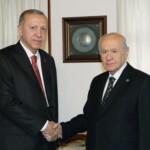Turkey’s stuttering performance and increasingly opaque means of doing business have led foreign direct investment (FDI) to decline from a peak of $22 billion in 2007 to $12.5 billion in 2021, the most recently available UNCTAD data shows.
The Turkish presidential and parliamentary elections on Sunday will be keenly watched by Gulf investors who have bet billions of dollars on the world’s 19th-largest economy.
Should incumbent president Recep Tayyip Erdoğan and his ruling AK Party again prevail in the votes, Turkey will maintain its unorthodox monetary policies.
The central bank has slashed interest rates by more than half over the past two years – to 8.5 percent – despite annual inflation running at more than 43 percent, according to the latest official figures.
Such policies have accelerated a collapse in the Turkish lira, which has lost 78 percent of its value against the dollar since May 2018. The lira is now worth less than a tenth of what it was a decade ago, with the valuations of Gulf-owned Turkish assets now considerably below what the buyers paid in hard currency terms.
Unemployment remains above 10 percent, while wages have failed to keep pace with soaring living costs.
Turkey’s stuttering performance and increasingly opaque means of doing business have led foreign direct investment (FDI) to decline from a peak of $22 billion in 2007 to $12.5 billion in 2021, the most recently available UNCTAD data shows.
“Turkey has the potential to be an economic powerhouse,” said Howard Eissenstat, a non-resident scholar at the Middle East Institute (MEI).
“It is located near both the Gulf and Europe, has a good industrial base, a highly skilled labour force and a tremendous amount of human capital. There are really good reasons to invest in Turkey – FDI has declined because Turkey has been mismanaged.”
Erdogan, who has been in power since 2003 – first as prime minister and then as Turkish president from 2014 – is unlikely to change his economic policies should he remain in situ after the election.
“Erdogan is somebody who doesn’t trust experts – authoritarians are bad economists and they’re even worse at managing the economy if they don’t listen to their own staff,” said Eissenstat.
Yet Gulf countries, especially Qatar, have invested heavily in Turkey in the past few years despite the country’s malaise and poor returns from previous multibillion dollar deals as part of wider efforts to de-escalate tensions in the Middle East.
A Saudi Arabia-Turkey business and investment forum last December was attended by ministers and around 280 companies from the two countries. About 12 memorandums of understanding were signed spanning various industries including renewable energy, minerals, mining, petrochemicals and manufacturing.
In November 2021 the UAE announced it would establish a $10 billion investment fund in Turkey that will acquire interests in various sectors such as logistics, energy, health and food. That follows a 2018 Qatar pledge to invest $15 billion directly in Turkey.
Western investors want a new government that re-establishes the checks and balances that once protected the economy, said Arda Tunca, a Bodrum-based independent Turkish economist.
“That’s not such a concern for Gulf investors,” said Tunca, noting Gulf governments would be wary of investing further into Turkey were Erdoğan to lose to rival presidential candidate Kemal Kılıçdaroğlu.
“Should they find common ground with the new government, they might continue but they won’t get the special protections and privileges Erdoğan gave them,” said Tunca. “Kılıçdaroğlu will shake hands with them, but in a different way.”
This is a shortened version of an article originally published by Arabian Gulf Business Insight.
The views and opinions expressed above are the authors’ and do not reflect those of the Free Turkish Press.


